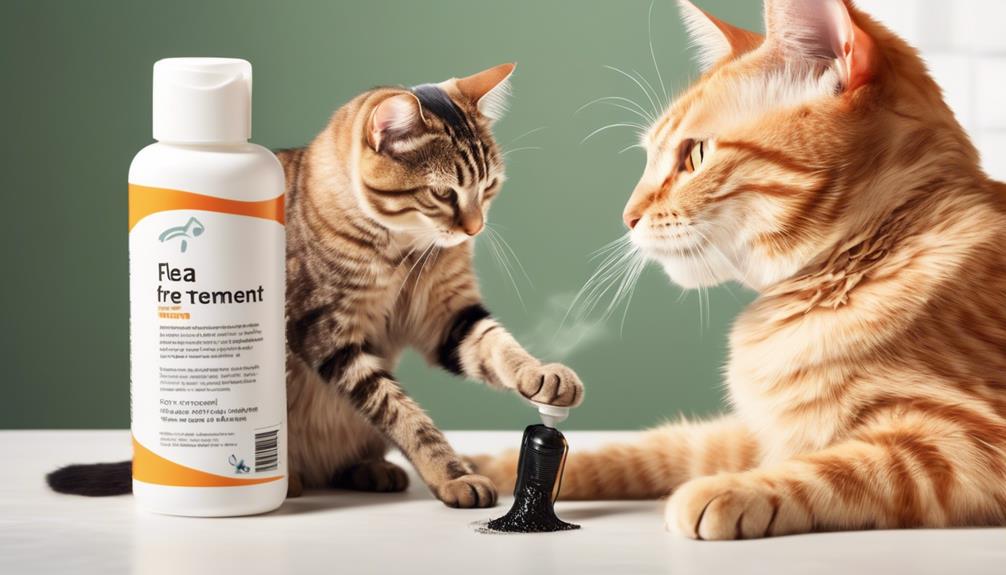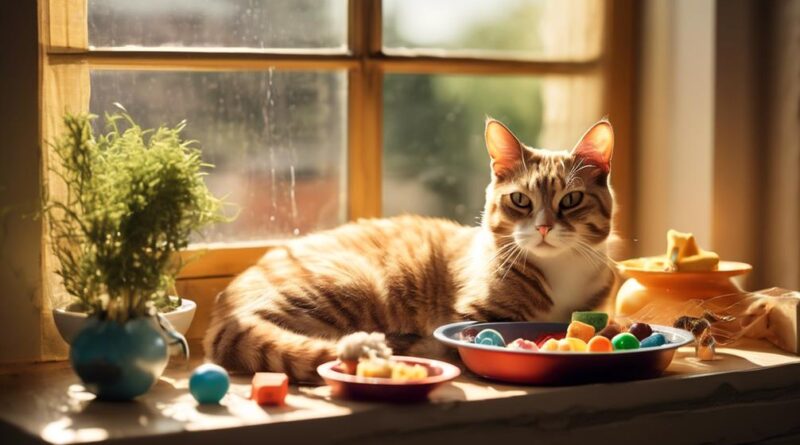Six Essential Tips for Boosting Your Cat's Health
You may have heard the saying that cats have nine lives, but ensuring your feline friend's health and longevity requires more than just luck.
With so much information out there, it can be overwhelming to know where to start. However, by implementing a few essential tips, you can make a significant impact on your cat's well-being.
From nutrition to mental stimulation, these key strategies can help you provide the best care for your beloved pet.
Proper Nutrition
To ensure optimal health for your feline companion, it's important to provide a balanced diet that meets their specific nutritional needs. Weight management is a crucial aspect of your cat's overall well-being. Just like humans, cats can also struggle with weight issues. Maintaining a healthy weight is essential to prevent various health problems such as diabetes, arthritis, and heart disease.
When selecting cat food, look for options labeled specifically for weight management. These formulas are designed to provide all the necessary nutrients while helping your cat maintain a healthy weight. Be mindful of portion sizes and avoid overfeeding, as this can lead to excessive weight gain.
Food allergies are another important consideration when it comes to your cat's nutrition. Some cats may develop allergies to certain ingredients in their food, leading to skin problems, digestive issues, or even behavioral changes. If you suspect that your cat has a food allergy, consult your veterinarian to determine the best course of action. They may recommend an elimination diet to identify the specific allergen or suggest switching to a hypoallergenic cat food.
Regular Exercise
Ensuring regular exercise for your cat is essential in maintaining their overall health and well-being. Just like humans, cats need physical activity to stay healthy and happy. Interactive toys are a great way to keep your cat engaged and active. Toys that mimic prey, such as feather wands or laser pointers, can help satisfy their natural hunting instincts and provide mental stimulation. Try rotating the toys to keep your cat interested and excited about playtime.
Incorporating a regular playtime routine into your cat's day can have numerous benefits. Not only does it help them stay physically fit, but it also strengthens the bond between you and your furry friend. Set aside dedicated time each day for interactive play, and make it a fun and rewarding experience for both of you. Engaging in play with your cat can also help alleviate boredom and reduce destructive behaviors.
Cats are natural hunters, and playtime provides them with an outlet for their hunting instincts. It's important to encourage them to stay active, especially if they're indoor cats. Regular exercise can prevent obesity, improve muscle tone, and promote agility. By making interactive toys and playtime a part of your cat's routine, you're contributing to their overall well-being and quality of life.
Hydration Importance
Regular exercise is essential for your cat's overall health and well-being. Adequate water consumption is crucial for your cat's health, as it supports various bodily functions and helps prevent issues like urinary tract problems and dehydration. Here are some hydration methods to ensure your cat stays properly hydrated:
- Fresh Water: Always provide your cat with fresh, clean water. Cats are more likely to drink water that's free from any odors or contaminants. Consider using a water fountain to entice your cat to drink more.
- Wet Food: Incorporating wet food into your cat's diet can significantly contribute to their overall water intake. This can be especially beneficial for cats that are picky drinkers.
- Multiple Water Stations: Place water bowls in different locations around your home. This ensures that your cat always has easy access to water, even if they spend time in different areas of the house.
Preventive Veterinary Care
Maintaining regular preventive veterinary care for your cat is essential for their long-term health and well-being. One crucial aspect of preventive care is ensuring your cat is up to date on their vaccination schedule. Vaccinations protect your cat from serious and potentially life-threatening diseases such as rabies, feline leukemia, and distemper. Your veterinarian will create a customized vaccination schedule based on your cat's individual needs and lifestyle, ensuring they receive the necessary immunizations at the right times.
In addition to vaccinations, preventive veterinary care also involves the use of preventative medicine techniques. This includes regular check-ups to assess your cat's overall health, detect any potential issues early, and provide preventive treatments as needed. Preventative medicine techniques may also include parasite prevention, such as flea and tick control, as well as regular dental care to prevent periodontal disease.
Stress Management
To ensure your cat's overall well-being, it's important to be mindful of their stress levels and incorporate effective stress management techniques into their daily routine. Cats, like humans, can experience stress, which may lead to health issues if left unaddressed.
Here are some essential tips for managing your cat's stress:
- Stress reduction: Create a calm and safe environment for your cat by providing hiding spots, elevated perches, and cozy bedding. This allows your cat to retreat to a quiet space when feeling overwhelmed. Additionally, establishing a consistent routine for feeding, playtime, and rest can help reduce stress by providing predictability and stability.
- Behavioral enrichment: Enrich your cat's environment with interactive toys, puzzle feeders, and scratching posts. Engaging your cat in regular play sessions not only provides physical exercise but also mental stimulation, which is vital for reducing stress and preventing boredom. Rotating toys and introducing new ones periodically can keep your cat's environment stimulating and engaging.
In addition to these tips, it's important to monitor your cat's behavior for signs of stress, such as excessive grooming, hiding, aggression, or changes in appetite. If you notice any concerning behaviors, consult with your veterinarian to develop a comprehensive stress management plan for your feline companion.
Dental Health
Ensuring your cat's dental health is essential for their overall well-being and longevity. Just like humans, cats can develop dental issues such as plaque, tartar, and gum disease. To maintain your cat's dental health, regular brushing and providing dental treats are vital.
Firstly, when it comes to brushing your cat's teeth, it's important to use a specially designed cat toothbrush and toothpaste. Human toothpaste can be harmful to cats, so always opt for products made specifically for felines. To start, introduce the toothbrush and toothpaste gradually, allowing your cat to sniff and taste them. Once they're comfortable, lift your cat's lip to expose their teeth and gently brush in a circular motion. Focus on the outer surfaces as these are prone to plaque buildup. It's essential to be patient and persistent, as some cats may take time to become accustomed to this routine.
In addition to brushing, providing dental treats can also contribute to your cat's oral hygiene. Dental treats are designed to help reduce plaque and tartar buildup while freshening your cat's breath. These treats often have a crunchy texture, which can help remove debris from your cat's teeth as they chew, promoting better dental health.
Parasite Control

Regular brushing and providing dental treats are essential for your cat's dental health.
Now let's turn our attention to the importance of controlling parasites to ensure your cat's overall well-being.
Parasites can pose a significant threat to your cat's health, but with proper control measures, you can help safeguard your feline friend from potential harm.
Here are some key points to consider:
- Flea Control: Fleas aren't only a nuisance for your cat but can also lead to skin irritation, allergic reactions, and even transmit diseases. To effectively control fleas, use vet-recommended flea treatments such as spot-on treatments, flea collars, or oral medications. Regularly vacuuming your home and washing your cat's bedding can also help in preventing flea infestations.
- Worm Prevention: Intestinal worms, such as roundworms, hookworms, and tapeworms, can adversely affect your cat's health and, in severe cases, lead to life-threatening conditions. Administering deworming treatments as per your veterinarian's recommendations is crucial to prevent and control worm infestations. Additionally, practicing good hygiene and keeping your cat away from environments where they could potentially ingest worm eggs or larvae is essential in preventing reinfestation.
Mental Stimulation
Keeping your cat mentally stimulated is essential for their overall well-being and happiness. Cats are intelligent and curious animals, and providing an enriching environment is crucial to prevent boredom and behavioral issues. One way to achieve this is by creating an enriching environment at home. You can achieve this by offering different levels for your cat to explore, such as cat trees, shelves, and perches.
These structures not only provide physical activity but also stimulate your cat's mind as they climb and explore their surroundings.
Interactive toys are another great way to provide mental stimulation for your cat. Toys that dispense treats or have hidden compartments for your cat to investigate can keep them engaged and mentally active. Puzzle feeders are also excellent for encouraging your cat to problem-solve and work for their food, mimicking their natural hunting instincts.
Regularly rotating and introducing new toys can also prevent your cat from losing interest and keep them mentally engaged.
In addition to physical play, interactive playtime with you can provide mental stimulation and strengthen your bond with your cat. Using toys like wand teasers or laser pointers can satisfy your cat's natural hunting instincts and provide mental and physical exercise. Spending quality playtime with your cat can also help alleviate stress and anxiety, contributing to their overall mental well-being.
Frequently Asked Questions
Can I Use Essential Oils to Help With My Cat's Stress Management?
Yes, you can use essential oils to help with your cat's stress management, but it's important to prioritize essential oil safety. Look for natural remedies for anxiety and consider other options for pet stress relief.
Are There Any Natural Remedies for Preventing Parasites in My Cat?
Yes, there are natural remedies for preventing parasites in your cat. Herbal treatments like neem oil and diatomaceous earth can help with flea control and overall feline wellness. Consult your vet for the best options.
How Can I Tell if My Cat Is Properly Hydrated?
To monitor your cat's hydration levels, gently pinch their skin. Proper hydration is vital for your cat's health. If the skin snaps back quickly, your cat is likely well-hydrated. If it moves slowly, your cat may need more water.
Can I Over-Exercise My Cat?
Yes, you can over-exercise your cat. It's important to find the ideal exercise levels for your cat to avoid potential dangers such as muscle strain, joint issues, and fatigue. Monitor their activity to ensure a healthy balance.
What Are Some Signs of Dental Health Issues in Cats?
If your cat has bad breath, drooling, swollen gums, or tooth loss, it could signal dental health issues. Regular dental check-ups and teeth cleanings are essential to keep your cat's teeth healthy and prevent potential problems.
Conclusion
So, take care of your feline friend by providing them with a balanced diet, keeping them active, ensuring they're properly hydrated, scheduling regular vet visits, managing their stress, maintaining their dental health, controlling parasites, and providing mental stimulation.
By following these essential tips, you can boost your cat's overall health and ensure they live a happy and fulfilling life.
